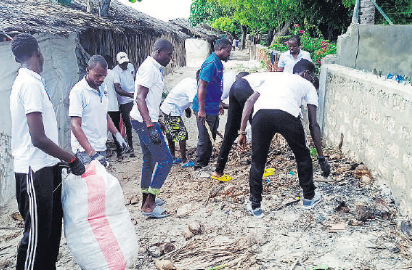
Beach pollution is among the greatest threats and the maritime sector will choke if caution is not taken, an industry player has warned.
The Maritime Organisation for Eastern, Southern, and Northern Africa called on the eight-member states to exercise caution and tackle pollution with urgency.
Moesna comprises founding member states including Kenya, Tanzania, Uganda, and Zambia, as well as DRC, Ethiopia, Burundi, and Botswana, with more countries soon to join.
The organisation is an offshoot of the Intergovernmental Standing Committee on Shipping which was established in 1967 to protect, promote, and coordinate the maritime interests of the member states.
Finance manager Harold Kalimina said the maritime sector is a cross-cutting sector and it takes a collective effort to shield it from unwanted consequences of individuals’ actions.
“As Moesna, we believe in a green environment and we feel it is the small things that actually matter,” Kalimina said.
“For instance, here we are doing beach cleaning. Plastics affect marine life and if one individual takes the necessary caution and becomes responsible when disposing of waste at the beach, then we believe it will have a knock-on effect.”
Although some cleaning is done at the Nyali beach, the disposal of the waste is not the best.
Most of the garbage is dumped behind the temporary structures along the beach and eventually finds its way back.
Moesna has formed a football team that comprises staff and non-staff members, with professionals such as lawyers, lecturers, teachers, and students as well as non-professionals forming part of the team.
The team was at the Nyali beach on Saturday to conduct a beach cleaning exercise.
“We urge the general public that the environment involves each one of you. Whatever one does anywhere affects you and whatever you do affects everyone else,” Kalimina said.
“Let us all take responsibility and ensure we live in a green environment.”
Single-use plastics account for 49 per cent of marine pollution and include items like bottles, sweet wrappers, straws, and cutlery.
During the clean-up, Moesna collected about 309kg of waste at the Nyali beach, with almost three-quarters of it being single-use plastic waste.
“If you buy soda, make sure you dispose of the bottle in the right manner. It starts with you and I,” the finance manager said.
The irresponsible disposal, especially of non-food items at the beach, has seen increased traffic due to the festive season.
“It is important that when you come to enjoy yourself at the beach, also ensure that all the waste is properly disposed of. Do not wait for or rely on the government to clean the beach for you,” he said.
Other major sea-based sources of marine pollution include discarded fishing gear, shipping activities, and legal and illegal dumping.
He called on fishermen to exercise responsible behaviour as they majorly rely on the sea for their livelihoods.
“All of this pollution causes serious economic losses,” Kalimina said.









